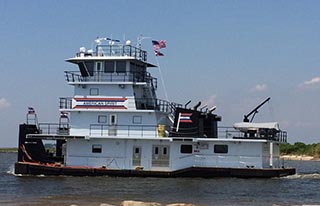Industry heavyweight American Commercial Lines Inc., and its subsidiary, ACBL Transportation Services LLC, Jeffersonville, Ind., face a federal Clean Water Act complaint, alleging the companies repeatedly violated waste water discharge permits at their Cairo, Ill., facility for seven years.
The civil complaint announced this week by the U.S. attorney’s office for the Southern District of Illinois alleges that the companies “repeatedly and consistently violated their National Pollutant Discharge Elimination System (NPDES) permits” between June 2007 and February 2014, and enumerates 554 instances when discharges from two office septic systems, a marine sanitation device, and a barge cleaning operating exceeded permit limits.
In a statement, ACL officials said the discharges came from sanitation malfunctions that the company itself discovered, and that they worked with state environmental officials to correct it.
“The majority of issues were related to two malfunctioning sanitation units that created discharge that exceeded permit limits,” the company said. “After discovering the problem, we self-reported it to the EPA and cooperated fully with the agency’s investigation. We have replaced the units with a system that eliminates discharge into the river entirely.”
Specifically, the complaint says wastewater discharges exceeded permit limits for four pollutants: biological oxygen demand, total suspended solids, total residual chlorine, and fecal coliform. Those exceedances were found in reports that ACL and ACBL submitted to the Illinois Environmental Protection Agency, the U.S. attorney’s office said. The complaint lists notes over 50 occasions from 2007 to 2013 when ACL exceeded its daily maximum limit for fecal coliform (bacteria counts in water contaminated by fecal matter) by a factor of nine or more. On 16 occasions coliform counts were 100 times over the permit limits, the complaint says.
During one reporting period in September 2009, total residual chlorine – a disinfectant, but also a pollutant that can be toxic to fish and other aquatic life even at low concentrations – allegedly registered more than 700 times the permit limit, the complaint said. Under the Clean Water Act prosecutors can seek civil penalties up to $37,500 per occurrence.
One of the nation’s biggest transport lines, ACL operates more than 4,000 barges and almost 150 towboats. The company in November completed its acquisition of AEP River Operations from American Electric Power, in a $550 million deal that doubled the size of its barge fleet.
“ACL is committed to protecting the environment in which we operate,” the company said. “We strive to exceed regulatory requirements and ensure continuous improvement in our environmental performance across all aspects of our business, boat and barge transportation, facilities and manufacturing."




